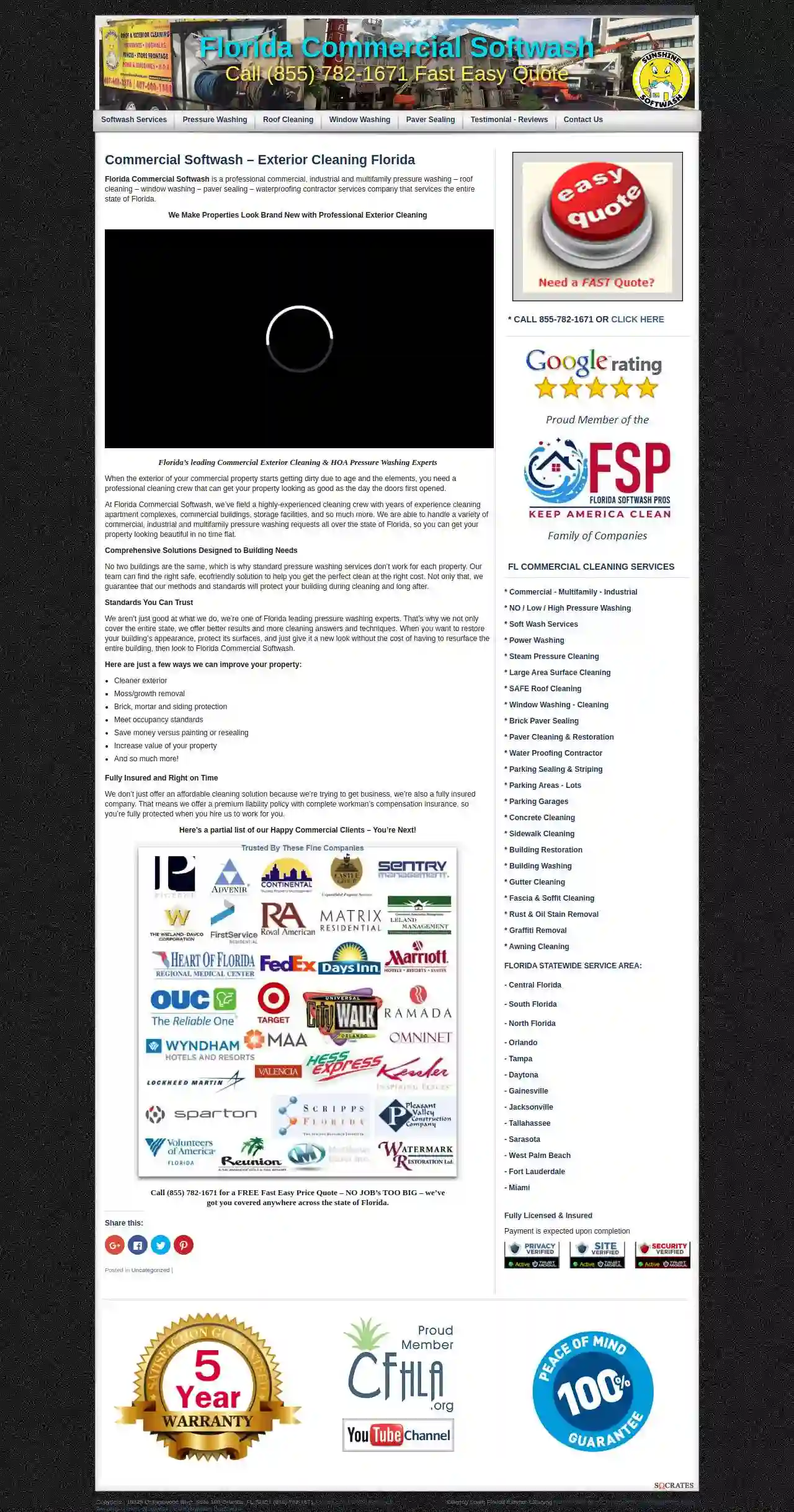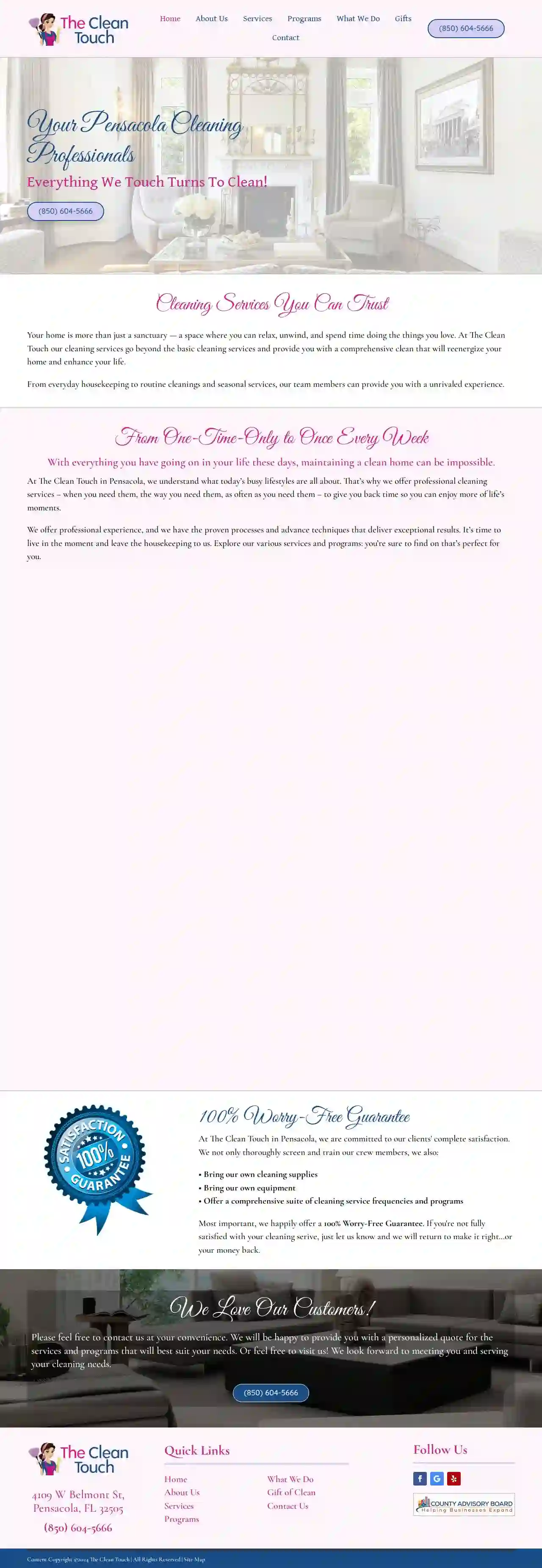Window Cleaning Quincy
Find top Window Washing in Quincy
Get 3 FREE Residential Window Washing quotes for your project today! Compare profiles, reviews, accreditations, portfolio, etc... and choose the best deal.

My Cleaning Angel
4.8675 reviews1509 W Carmen St, Unit 2205, Tampa, 33606, USMy Cleaning Angel is a professional cleaning service dedicated to providing exceptional cleaning solutions for both residential and commercial clients. We are a team of highly trained and experienced cleaners committed to delivering sparkling clean and healthy environments. Our services are designed to meet the unique needs of each client, ensuring complete satisfaction. We offer a wide range of cleaning options, including one-time, recurring, deep cleaning, move-in/move-out cleaning, post-construction cleaning, and vacation rental cleaning. We also specialize in cleaning for various commercial sectors, such as banks, financial institutions, car dealerships, churches, daycare centers, government facilities, gyms, medical offices, offices, property managers, retail facilities, schools, and universities. We are fully insured and bonded, providing peace of mind to our valued clients.
- Services
- Why Us?
- Gallery
Get Quote
Florida Commercial Softwash Services
52 reviews10325 Orangewood Blvd. Suite 103, Orlando, 32821, USFlorida Commercial Softwash is a professional commercial, industrial and multifamily pressure washing – roof cleaning – window washing – paver sealing – waterproofing contractor services company that services the entire state of Florida. We understand that the exterior of your commercial property is the first impression it makes, and we're dedicated to helping you keep it looking its best. Our highly-experienced cleaning crew has years of experience cleaning apartment complexes, commercial buildings, storage facilities, and more. We offer a variety of commercial, industrial and multifamily pressure washing requests all over the state of Florida, so you can get your property looking beautiful in no time. We don't believe in a one-size-fits-all approach to cleaning. That's why we take the time to understand your specific needs and develop a customized cleaning plan that's right for you. We use only the safest, most eco-friendly cleaning solutions and techniques to ensure that your property is cleaned effectively and safely. We're also fully insured and bonded, so you can rest assured that your property is in good hands. Here are just a few ways we can improve your property: Cleaner exterior, Moss/growth removal, Brick, mortar and siding protection, Meet occupancy standards, Save money versus painting or resealing, Increase value of your property, and so much more!
- Services
- Why Us?
- Accreditations
- Our Team
- Testimonials
- Gallery
Get Quote
Florida Commercial Exterior Cleaning
51 reviews2100 Gerda Terrace, Orlando, 32804, USFlorida Commercial Exterior Cleaning is a professional commercial, industrial and multifamily pressure washing – roof cleaning – window cleaning – paver sealing – waterproofing contracting company that services the entire state of Florida. We’re Florida’s leading commercial & HOA pressure washing experts! With our professional-quality equipment and years of experience, we know how to take care of commercial buildings at a lower cost and still give AMAZING results! Our “soft wash” pressure washing service restores building surfaces and appearance to NEW LIFE – without the high cost of re-surfacing!
- Services
- Why Us?
- Gallery
Get Quote
Mr. Marvel Window Cleaning
57 reviewsLos Angeles, CA, 90063, USMr. Marvel Window Cleaning is a family owned business based in Los Angeles, California. We serve the greater Los Angeles area from Malibu to Pasadena to Irvine. We specialize in helping you maintain your home looking clean and beautiful by offering Window Cleaning, House cleaning, House wash, and Pressure washing.
- Services
- Why Us?
- Testimonials
- Gallery
Get Quote
941 Window Cleaning LLC
4.230 reviewsSarasota, USWe offer professional window cleaning and pressure washing services for both residential and commercial buildings. Contact us to schedule a free quote, with absolutely no obligation or pressure to buy. Since each building is different and has its own quirks, an on-site inspection is needed, only to make sure the estimate is accurate. We are a licensed and insured company that covers Sarasota, Bradenton, Venice, North Port, Ellenton, Longboat Key, Manasota Key, Parrish , Sun City Center areas. (Please call for availability) Services include cleaning and detailing residential as well as commercial buildings. All necessary bonding liability and workers compensation insurances are carried by the company. As an owner and operator, I personally guarantee that every job will be done with care, patience and expertise.
- Services
- Why Us?
- Our Team
- Gallery
Get Quote
Window Genie of Bradenton
4.970 reviews4901 14th St W, Suite 100, Bradenton, 34205, USWindow Genie of Bradenton is your local expert for all your window and pressure washing needs. We offer a wide range of services, including window cleaning, pressure washing, solar panel cleaning, holiday lighting, gutter cleaning, and window tinting. Our team of highly trained professionals is dedicated to providing you with the highest quality service at competitive prices. We are a Neighborly company, and we are committed to providing our customers with the best possible experience.
- Services
- Why Us?
- Gallery
Get Quote
Mr. Clean Windows
4.513 reviews4656 Ashton Rd, Sarasota, 34233, USMr. Clean Windows is a family-owned and operated window cleaning service in Sarasota, FL, and surrounding areas. We pride ourselves on providing friendly, professional service with fully insured and experienced technicians handling hundreds of jobs weekly. Our commitment to promptness, cleanliness, and quick responses ensures a positive experience for every customer. We offer a wide range of cleaning services, including window cleaning, pressure washing, whole house cleaning, driveway cleaning, and interior cleaning. We invest heavily in our staff and equipment to deliver high-quality services. Our team is skilled, experienced, and regularly trained to meet the evolving needs of our clients. We also utilize modern equipment to ensure efficiency and exceptional results. As a licensed company, we adhere to all quality, environmental, and safety standards, guaranteeing services that exceed expectations. Serving Port Charlotte and surrounding areas like Cape Coral and Estero, Mr. Clean Windows is your trusted partner for all your cleaning needs.
- Services
- Why Us?
- Gallery
Get Quote
The Clean Touch
56 reviews4109 W. Belmont St., Pensacola, 32505, USYour home is more than just a sanctuary — a space where you can relax, unwind, and spend time doing the things you love. At The Clean Touch our cleaning services go beyond the basic cleaning services and provide you with a comprehensive clean that will reenergize your home and enhance your life.From everyday housekeeping to routine cleanings and seasonal services, our team members can provide you with a unrivaled experience. With everything you have going on in your life these days, maintaining a clean home can be impossible.At The Clean Touch in Pensacola, we understand what today’s busy lifestyles are all about. That’s why we offer professional cleaning services – when you need them, the way you need them, as often as you need them – to give you back time so you can enjoy more of life’s moments.We offer professional experience, and we have the proven processes and advance techniques that deliver exceptional results. It’s time to live in the moment and leave the housekeeping to us. Explore our various services and programs: you’re sure to find on that’s perfect for you.
- Services
- Why Us?
- Gallery
Get Quote
Miami window cleaning services
SW 26th terrace, Miami, 33133, USWelcome to miami window cleaning services, Miami's preferred exterior cleaning company. We serve all areas of Miami Dade and Broward County. Our unique window cleaning process keeps your property cleaner longer. Our crews are professionally trained in all cleaning techniques for windows & exteriors. We are fully insured and bonded. Our customers feel safe doing business with a company that protects their interests. Miami window cleaning services offers a complete line of cleaning services: window cleaning services, High rise window cleaning, pressure washing, window washing, roof cleaning, Post construction cleaning, House cleaning, and Gutter cleaning. We provide services to homeowners and business owners in South Florida.
- Services
- Why Us?
- Gallery
Get Quote
Clean Xpert Pros LLC
4.950 reviews1410 SE 47th Terrace, Cape Coral, FL 33904, 33904, USClean Xpert Pros LLC is a family owned and insured HVAC, pressure washing, and indoor air quality company that provides healthy solutions for healthier homes. We offer honest, affordable AC repair, AC replacement, AC Maintenance, pressure washing, soft washing, and indoor air quality services for residential properties that you can trust. We service all of southwest Florida, including Lee County, Collier County, and Charlotte County, Florida. With our 30 years of experience, we can tackle any exterior or interior cleaning project, including AC replacement, AC repair, AC maintenance, pressure washing, roof cleaning, paver cleaning, window cleaning, air duct cleaning, air duct sanitizing, whole house fogging, and more. No job is too big or too small - we do it all!
- Services
- Why Us?
- Gallery
Get Quote
Over 60,241+ Cleaning Businesses in our network
Our cleaning pros operate in Quincy and surroundings!
CleaningMatch has curated and vetted Top Cleaning Services arround Quincy. Find a reliable business today.
Frequently Asked Questions About Window Cleaning
- Vinegar Solution: Mix equal parts white vinegar and water in a spray bottle. Apply to the stains, let it sit for a few minutes, then scrub with a non-abrasive sponge and rinse. Vinegar's acidity helps dissolve mineral deposits.
- Baking Soda Paste: Make a paste of baking soda and water, apply to the stains, let it dry, then scrub and rinse. Baking soda acts as a gentle abrasive to remove stains.
- Commercial Hard Water Stain Remover: Use a commercial hard water stain remover according to the product instructions. These products are often formulated with stronger cleaning agents to tackle tough stains.
- Professional Window Cleaning: For severe hard water stains or if you prefer to avoid DIY methods, hire a professional window cleaning service. They have specialized tools and solutions for removing stubborn stains.
- Squeegees: A T-shaped tool with a rubber blade, used to remove cleaning solution from the glass, leaving a streak-free finish.
- Microfiber Cloths: Soft, lint-free cloths that are highly effective at cleaning glass without scratching.
- Buckets: Used to hold cleaning solutions and rinse water.
- Spray Bottles: Used to apply cleaning solutions to windows.
- Scrapers: Used to remove stubborn dirt, paint splatters, or stickers from windows.
- Extension Poles: Extend the reach of squeegees and brushes, allowing cleaners to reach high windows without ladders.
- Water-Fed Pole Systems: Use purified water and a telescopic pole with a brush head to clean windows from the ground.
- Number of Windows: The more windows you have, the higher the cost will generally be.
- Size and Type of Windows: Large windows, multi-paned windows, or windows with special features (e.g., skylights) may cost more to clean.
- Accessibility: Windows that are difficult to reach (e.g., high-rise windows) will require specialized equipment and may cost more.
- Interior vs. Exterior: Cleaning both interior and exterior windows will cost more than cleaning just one side.
- Frequency: Regular cleaning schedules often come with discounted rates compared to one-time cleanings.
How do I remove hard water stains from my windows?
Always test any cleaning solution on a small, inconspicuous area of the window first to ensure it doesn't damage the glass.
What are some common window cleaning tools?
These specialized tools, combined with professional techniques, ensure efficient and effective window cleaning results.
Can I clean my own windows effectively?
If you choose to clean your own windows, use a good quality glass cleaner and microfiber cloths. Avoid cleaning windows in direct sunlight, as the cleaning solution can dry too quickly and leave streaks. It's also crucial to take safety precautions if you're cleaning high windows, using a stable ladder and having someone spot you.
How much does professional window cleaning cost?
To get accurate pricing, request quotes from multiple window cleaning companies. Be sure to provide detailed information about your windows and cleaning requirements.
How do I remove hard water stains from my windows?
- Vinegar Solution: Mix equal parts white vinegar and water in a spray bottle. Apply to the stains, let it sit for a few minutes, then scrub with a non-abrasive sponge and rinse. Vinegar's acidity helps dissolve mineral deposits.
- Baking Soda Paste: Make a paste of baking soda and water, apply to the stains, let it dry, then scrub and rinse. Baking soda acts as a gentle abrasive to remove stains.
- Commercial Hard Water Stain Remover: Use a commercial hard water stain remover according to the product instructions. These products are often formulated with stronger cleaning agents to tackle tough stains.
- Professional Window Cleaning: For severe hard water stains or if you prefer to avoid DIY methods, hire a professional window cleaning service. They have specialized tools and solutions for removing stubborn stains.
Always test any cleaning solution on a small, inconspicuous area of the window first to ensure it doesn't damage the glass.
What are some common window cleaning tools?
- Squeegees: A T-shaped tool with a rubber blade, used to remove cleaning solution from the glass, leaving a streak-free finish.
- Microfiber Cloths: Soft, lint-free cloths that are highly effective at cleaning glass without scratching.
- Buckets: Used to hold cleaning solutions and rinse water.
- Spray Bottles: Used to apply cleaning solutions to windows.
- Scrapers: Used to remove stubborn dirt, paint splatters, or stickers from windows.
- Extension Poles: Extend the reach of squeegees and brushes, allowing cleaners to reach high windows without ladders.
- Water-Fed Pole Systems: Use purified water and a telescopic pole with a brush head to clean windows from the ground.
These specialized tools, combined with professional techniques, ensure efficient and effective window cleaning results.
Can I clean my own windows effectively?
If you choose to clean your own windows, use a good quality glass cleaner and microfiber cloths. Avoid cleaning windows in direct sunlight, as the cleaning solution can dry too quickly and leave streaks. It's also crucial to take safety precautions if you're cleaning high windows, using a stable ladder and having someone spot you.
How much does professional window cleaning cost?
- Number of Windows: The more windows you have, the higher the cost will generally be.
- Size and Type of Windows: Large windows, multi-paned windows, or windows with special features (e.g., skylights) may cost more to clean.
- Accessibility: Windows that are difficult to reach (e.g., high-rise windows) will require specialized equipment and may cost more.
- Interior vs. Exterior: Cleaning both interior and exterior windows will cost more than cleaning just one side.
- Frequency: Regular cleaning schedules often come with discounted rates compared to one-time cleanings.
To get accurate pricing, request quotes from multiple window cleaning companies. Be sure to provide detailed information about your windows and cleaning requirements.